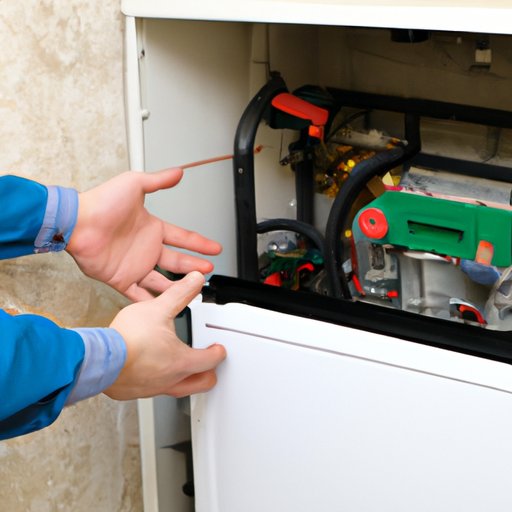Explaining the Refrigerator Compressor: A Step-by-Step Guide
A refrigerator compressor is the heart of any refrigeration system. It compresses the refrigerant gas, which, when cooled, provides the cooling effect that keeps food fresh and appliances running efficiently. Understanding how a refrigerator compressor works can help you diagnose and fix common problems as well as determine if it’s time to replace your current unit.
Overview of Refrigerator Compressors
A refrigerator compressor is a motorized device that squeezes or compresses the refrigerant gas inside the refrigerator. This pressurizes the gas, allowing it to absorb heat from its surroundings. The resulting cold air is then circulated throughout the refrigerator, keeping the contents cool.
Components of a Refrigerator Compressor
The primary components of a refrigerator compressor are the compressor motor, condenser coils, evaporator coils, and expansion valve. The compressor motor is responsible for compressing the refrigerant gas, while the condenser coils and evaporator coils are used to transfer heat from the interior of the refrigerator to the outside environment. Finally, the expansion valve regulates the amount of pressure on the refrigerant gas by controlling the flow rate.

Understanding the Inner Workings of a Refrigerator Compressor
In order to understand how a refrigerator compressor works, it’s important to understand the science behind it. The process begins with the compressor motor, which compresses the refrigerant gas in the form of a vapor. As the gas is compressed, it becomes increasingly hot and pressurized.
The Science Behind Refrigerator Compressors
The hot and pressurized refrigerant gas is then pushed through the condenser coils, which act as radiators. As the gas passes through the coils, heat is transferred to the outside environment, cooling the gas in the process. The now cooled and pressurized refrigerant gas is then passed through the evaporator coils, where it absorbs heat from the interior of the refrigerator. This heat absorption causes the gas to turn back into a vapor, completing the refrigeration cycle.
Types of Refrigerant Used in Compressors
The type of refrigerant used in a compressor depends on the application. Commonly used refrigerants include chlorofluorocarbons (CFCs), hydrochlorofluorocarbons (HCFCs), hydrofluorocarbons (HFCs), and natural refrigerants such as carbon dioxide (CO2). Each type of refrigerant has different properties, so it’s important to choose the right one for the job.

Troubleshooting Common Issues with a Refrigerator Compressor
Common issues with refrigerator compressors include loud noises, leaking refrigerant, and poor cooling performance. If you experience any of these issues, there are a few steps you can take to troubleshoot the problem.
Potential Problems
The first step is to check for any visible signs of damage to the compressor or its surrounding components. If you find any damaged parts, they should be replaced immediately. You should also check the refrigerant levels, as low refrigerant can cause poor cooling performance. Finally, make sure the compressor motor is functioning properly and that all electrical connections are secure.
Solutions to Common Problems
If all else fails, it may be time to call a professional technician. They will be able to diagnose and repair any underlying issues with your compressor. Additionally, they can recommend any necessary repairs or replacements that may be required.
The Pros and Cons of Refrigerator Compressors
Refrigerator compressors come with both advantages and disadvantages. Understanding these pros and cons can help you decide if this type of compressor is right for your needs.
Advantages
One of the main advantages of refrigerator compressors is their energy efficiency. Unlike other types of compressors, refrigerator compressors use less power, making them more cost-effective in the long run. Additionally, they are relatively quiet compared to other types of compressors.
Disadvantages
The main disadvantage of refrigerator compressors is their high cost. They are typically more expensive than other types of compressors, so they may not be the best choice for those on a budget. Additionally, they require regular maintenance to ensure optimal performance.
Conclusion
A refrigerator compressor is an essential component of any refrigeration system. Understanding how a refrigerator compressor works can help you diagnose and fix common problems as well as determine if it’s time to replace your current unit. While refrigerator compressors have their advantages, they also come with some drawbacks, including their higher cost and need for regular maintenance. Ultimately, the decision of whether or not to invest in a refrigerator compressor should be based on your individual needs and budget.


